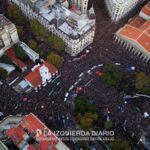
An editorial of the British newspaper denounces global complicity and charges actions that go beyond diplomatic discourses that sound empty in the face of horror
In an incisive editorial and charged with humanitarian indignation, the British newspaper The Guardian He has released a strong warning about the escalation of hunger in Gaza, denouncing that the international community, especially the Western Allies of Israel, is becoming complicit in a process of systematic destruction of the Palestinian people. Published this week, the text spares no criticism and requires more than symbolic statements: it requires concrete action.
The editorial points out that July was one of the deadliest months of the conflict, with a person being killed every 12 minutes for Israeli attacks. United Nations data reveal that more than a thousand Palestinians lost their lives only while trying to access food – many died in riots around help distribution centers. Behind these tragic images, there is an even darker scenario: the calculated use of hunger as a weapon of war.
Also read:
US tariff overthrows values in the Brazilian market
“Rigidly engineered, strictly monitored, precisely designed,” describes Professor Alex de Waal, a specialist in humanitarian crises, quoted in the text. This characterization is not only rhetorical: it is a direct accusation that deprivation in Gaza is not a side effect of war, but part of a deliberate strategy. More than 100 help organizations have warned that hunger spreads with alarming speed. The Gaza Ministry of Health said that in a single day-Tuesday-at least ten people died of extreme innion and malnutrition.
The editorial paints a bleak picture: parents watching their children will define, adults fainting on the streets for lack of food, forced families to decide which child will eat that day. Hunger does not only kill bodies – it destroys minds, breaks family ties and erodes the social structure. Desperate people are led to acts of despair, such as stealing food from other victims of the same tragedy. And even when there are attempts to help, the situation becomes unfeasible: many NGOs have already sold out their inventories, and others claim that social disintegration has made help distributing a deadly risk to teams and beneficiaries.
The Israeli government, according to the editorial, tries to divert responsibility, blaming Hamas for withdrawals to aid trains. But the newspaper harshly countered: “This is a government that set a criminal gang accused of stealing humanitarian aid.” Irony, according to the text, is cruel and revealing.
The core of the argument of The Guardian It is in a clear line of international law: the convention for the prevention and repression of genocide crime expressly prohibits “deliberately inflicting a group calculated living conditions to provoke its total or partial destruction”. Even if a minimal amount of help keeps part of the population alive, the process of collective destruction is underway. “Destroying a people does not require killing everyone. Just destroy their conditions of existence,” says the editorial.
Given this, the diplomatic convictions sound empty. On Monday, the United Kingdom and 27 other countries issued a tough statement, accusing Israel of denying the Palestinians “human dignity.” The US ambassador’s response in Israel, Mike Huckabe, was contempt: he called the disgusting statement. But for the newspaper, what matters is not the tone of words, but the weight of actions – or lack of them.
O The Guardian He acknowledges that the United Kingdom has taken some measures: I imposed sanctions on far-right ministers of the Israeli government, resumed funding from the UN agency for Palestinian refugees (Unrwa) and suspended part of weapon exports. However, the editorial of course: these actions came too late and are insufficient. The European Union, Israel’s largest commercial partner, has not yet been able to unify a position. His head of foreign policy, Kaja Kallas, said that “all options are on the table,” but so far none has been put into practice.
The newspaper concludes with an urgent call: given the systematic destruction of Palestinian life in Gaza, Western countries need to respond with systematic, comprehensive and concrete measures. Economic sanctions, total weapons embargo, suspension of preferred trade agreements – all this needs to be put into practice. The recognition of the Palestinian state, though important, is not the central point. What is at stake is the world’s ability to prevent genocide while it happens.
“If not now, when?” Asks the editorial. “What else will it take to convince them?” And leaves a warning that echoes beyond the borders of Gaza: this is, above all, a Palestinian tragedy. But if states continue to close their eyes on the wide open violation of international humanitarian law, the consequences will be felt far beyond the Middle East. The story, says the text, will not ask if these governments did something. Will ask if they did everything they could.
Meanwhile, in Gaza, hunger follows its course – silent, cruel and planned.
Head of WHO denounces: Hunger in Gaza is “caused by man” and requires immediate end of block
In a blunt warning that echoes throughout the international humanitarian scenario, the director-general of the World Health Organization (WHO), Tedros Adhanom Ghebreyesus, said on Wednesday that what is living in Gaza cannot be described otherwise but as “mass hunger-and is a human cause.” The words, urgent and indignation, come in the midst of an unprecedented aggravation of the food crisis in the Gaza Strip, where more than 100 humanitarian organizations have launched a joint appeal for Israel to raise the block that prevents vital aid from entering.
The scenario described by Tedros is of total collapse. While tons of food, drinking water, medications and fuel accumulate dust in warehouses near the border, thousands of Palestinians die from inonionic. Only in the last 24 hours, at least 10 people died of extreme malnutrition, raising to 111 the number of deaths directly linked to hunger from the beginning of climbing – 80 of them children. Each name, each number, carries with it a story of abandonment, silent pain, a body that crumbles for lack of the most basic: food.
A letter signed by 109 organizations, including doctors without borders, Oxfam Internacional and Amnesty International, denounces that the Israeli government has prevented humanitarian aid from being effectively distributed. “On the outskirts of Gaza, in warehouses-and even inside Gaza itself-tons of food, drinking water, medical supplies, shelter and fuel items remain untouched, with humanitarian organizations prevented from accessing or delivering them,” they wrote collectively. “The restrictions, delays and fragmentation imposed by the Israeli government under its total siege generated chaos, hunger and death.”
An excerpt from the letter touches the background: A humanitarian worker reported that children in Gaza tell parents they want to “go to heaven, because at least the sky has food.” A sentence that, for its tragic simplicity, summarizes the desperation of a generation that grows under rubble, hopeless, with no future, without lunch.
Daily distribution of aid currently is equivalent to about 28 trucks. Before the war, there were about 500 entering daily to support a population of more than 2 million people. The difference is not just numerical – it is the difference between surviving and resisting, between maintaining dignity and being reduced to fighting for crumbs.
Meanwhile, violence follows its relentless course. In July, Israel killed one person every 12 minutes, according to UN data analysis, making the month one of the most lethal of the conflict. On Wednesday, Israeli attacks killed at least 21 people, including women and children. Among the victims were two Palestinian journalists: Tamer Al-Za’anin and Walaa Al-Jabari, seven-month-old pregnant. As a result, the number of press professionals killed in Gaza since October 2023 has reached 229 – one of the greatest taxes paid for those who try to show the world what is happening.
The repression goes beyond bombing. Dr. Marwan Al-Hams, interim director of Gaza’s campaign hospitals, remains detained by Israeli forces, with his detention extended by the end of the month. Wounded by a shot in the leg during prison, he represents what many see as a direct attack on the medical and humanitarian infrastructure of the territory.
At the same time, the way help is distributed has generated controversy. The Gaza Humanitarian Foundation (GHF), supported by the US and Israel, began to control food distribution points. However, UN employees have already classified these places as “deadly traps”, where civilians are shot while waiting for a bag of flour or a liter of oil. Guardian had already reported that hundreds died in chaotic operations around these points, where the promise of food becomes a death zone.
GHF justifies its model by stating that it prevents Hamas from stealing – a claim repeated by the Israeli government. But independent humanitarian organizations reject this narrative, arguing that the true crime here is not withdrawal, but the strategic use of hunger as a weapon of war. When controlling, restricting and manipulating access to food, survival is transformed into a currency of exchange. And this, according to international law experts, may be a crime of war.
The UN has already recorded that more than 1,000 Palestinians have been killed while trying to access help distribution points since late May. Israel systematically denies that block helps, stating that “he considers the transfer of humanitarian aid to Gaza to a matter of extremely important” and that he works to facilitate his entry. However, the facts on the ground tell another story: trucks are retained, inspected for hours, or simply barred. The bureaucracy became a weapon.
Meanwhile, UN’s highest humanitarian employee in Gaza had his visa canceled, and WHO facilities in Deir Al-Balah were attacked. The message is clear: even help is price – and this price is life.
Despite the climbing, there are signs that the diplomatic scenario may be moving. The US envoy to the Middle East, Steve Witkoff, traveled to Rome this week for meetings with the main counselor of the Israeli government, Ron Dermer, and Palestinian representatives. If there is advancement, Witkoff will go to Doha, where indirect negotiations between Israel and Hamas are underway. Although there are still obstacles, the parties seem to have surpassed some of the main differences about a possible ceasefire.
The impulse for a truce gained strength after the declaration of 28 countries – including the United Kingdom and other Israeli allies – which on July 21 demanded the end of the war and condemned the “denial of essential humanitarian assistance” as “unacceptable.” The statement also criticized the violence of settlers in the West Bank and the Israeli plans to transfer Palestinians to a “humanitarian city”, described by a former Israeli Prime Minister as a “concentration camp” and compared to ethnic cleaning.
Despite the strong tone, the statement did not include threats of sanctions or concrete measures. And that’s where, for many, the speech still fails. “Fragmented agreements and symbolic gestures, such as air releases or failed aid agreements, serve as a smoke curtain for inaction,” warns the NGO letter. “They cannot replace the legal and moral obligations of states to protect Palestinian civilians and ensure significant access on a large scale.”
More than 59,000 people have been killed in Gaza since the beginning of the Israeli offensive, triggered after the Hamas attack on October 7, 2023, which killed about 1,200 Israelis. But, as humanitarian editorials and reports remind, the military response cannot justify the collective punishment of an entire people.
Hunger in Gaza is not an accident. It is a choice. And while the world debates, children die calling the sky where there is food. The increasingly urgent question is: How long will we accept that human dignity is negotiable?
With information from The Guardian*
Source: https://www.ocafezinho.com/2025/07/24/the-guardian-defende-gaza-em-editorial-sera-preciso-mais-para-deter-o-genocidio/

